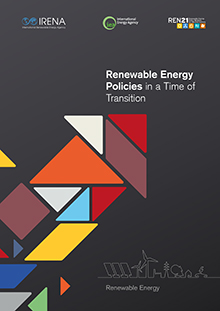Renewable energy policies in a time of transition
 Spurred by innovation, increased competition, and policy support in a growing number of countries, renewable energy technologies have achieved massive technological advances and sharp cost reductions. Renewables have come to the forefront of the global energy transition, with nearly every country adopting a renewable energy target. Yet progress has been uneven in different countries and sectors. Technology and financial risks still hamper the expansion of renewables into new markets. As the power sector develops further, the increased adoption of variable renewables like solar and wind requires more flexible systems. Compared to power generation, the regulatory framework for end-use sectors lags behind. This report, prepared jointly by the International Renewable Energy Agency (IRENA), the International Energy Agency (IEA) and the Renewable Energy Policy Network for the 21st Century (REN21), identifies key barriers and highlights policy options to boost renewable energy deployment.
Spurred by innovation, increased competition, and policy support in a growing number of countries, renewable energy technologies have achieved massive technological advances and sharp cost reductions. Renewables have come to the forefront of the global energy transition, with nearly every country adopting a renewable energy target. Yet progress has been uneven in different countries and sectors. Technology and financial risks still hamper the expansion of renewables into new markets. As the power sector develops further, the increased adoption of variable renewables like solar and wind requires more flexible systems. Compared to power generation, the regulatory framework for end-use sectors lags behind. This report, prepared jointly by the International Renewable Energy Agency (IRENA), the International Energy Agency (IEA) and the Renewable Energy Policy Network for the 21st Century (REN21), identifies key barriers and highlights policy options to boost renewable energy deployment.
Related Content
- Energy taxonomy: classifications for the energy transition
- World investment report 2023: investing in sustainable energy for all
- Renewable energy supply and risk in global banking
- Commodities at a glance: special issue on access to energy in sub-Saharan Africa
- Electricity market report 2023
- Financing the Indian green energy dream: scale, risk nuances and policy response
